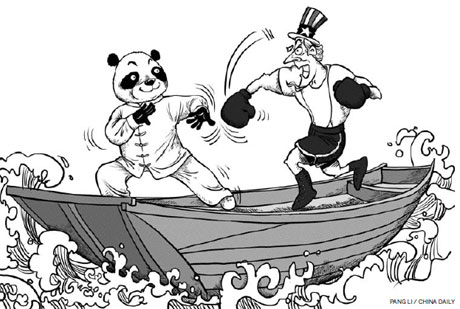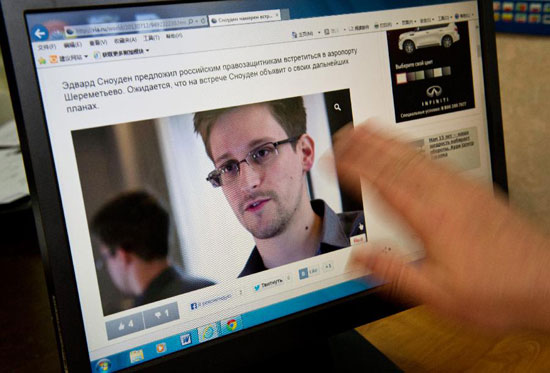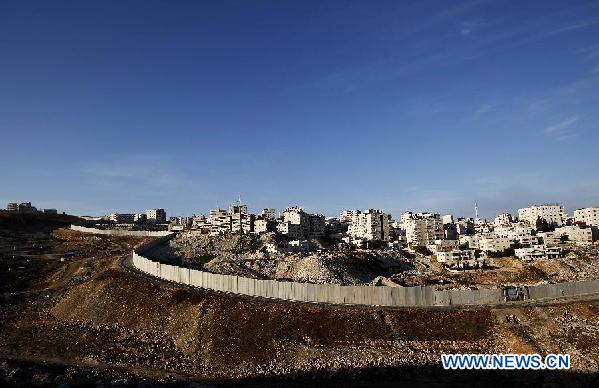
26 Jan, 2014
China identifies the Top Ten international security issues in 2014
 |
| (Pang Li / China Daily) |
1. The U.S. will have limited opportunities to promote its Asia-Pacific “rebalancing strategy”
Diplomatically, the United States will not relax this “rebalancing strategy”, because this region is both the engine of the world economy and the fulcrum of international security. But domestically, while the U.S. economy is on a modest path to recovery, it is not yet fully out of the shadow of the financial crisis. This year the U.S. will hold mid-term elections, so the Republican and Democratic parties will continue to battle over domestic affairs. In addition, due to the rising trend of American isolationism in recent years, Obama has to direct more attention to domestic affairs. All this means that he will have fewer opportunities to promote his Asia-Pacific “rebalancing strategy”.
US initiatives in 2014 will include the following:
The first will be to continue to strengthen relations with its allies and consolidate ties with new partners. The U.S. adopted an acquiescent stance on Japan’s plan to rewrite the constitution, to exercise the right of collective self-defense, and to build up its defense forces. However, the disappointment expressed by the U.S. at Abe’s visit to the Yasukuni Shrine on December 26 shows that the U.S. will not allow Japan to go so far as to damage U.S. interests in the Asia-Pacific region.
The second will be to focus on the Asia-Pacific defense system, to try to establish military cooperation with relevant nations to secure its foothold there, and to deploy weapons and equipment in the region.
The third will be to ensure the dominance of the US dollar in the Asia-Pacific region. The U.S. is pushing its TPP agenda, and among its objectives here are to prevent the formation of a unified trading bloc in Asia, to stay involved in the process of regional integration, and to ensure its own geopolitical and economic interests.
The fourth will be to repair any relations with other major powers which have been damaged by the “rebalancing” strategy.
 |
| (GT/Liu Rui) |
2. Western use of force against Syria can’t be ruled out
When conflict first broke out in Syria in 2011, the U.S. and its allies intervened immediately. The goal was to support the opposition in overthrowing the Assad government and thereby break up the Iran – Syria strategic alliance.
In August 2013 the Assad government found itself in a critical situation, when the U.S. accused it of killing hundreds of civilians in chemical weapons attacks. Ready to use military force against Syria, the U.S. and France prepared to deploy troops. At the critical moment, Russia’s proposal to “exchange chemical weapons for peace” was accepted by both the Assad government and the U.S. The U.S. and Russia reached a consensus to convene a second meeting in Geneva to achieve Syria’s political transition.
Developments in the Syrian crisis have given the world the expectation that the issue will be resolved by political agreement. However, conditions apply: the Assad government must step down, which is the core of the “political transition” advocated by the U.S. and the EU.
The destruction of Syria’s chemical weapons will not stop the U.S. from using force against the country. There has merely been a postponement. Why? First, the handover of Syria’s chemical weapons counts as a “moral victory” for the U.S. and also eliminates any concern for their future use.Second, the Syrian army is fighting extremist religious forces and al-Qaeda groups, and the U.S. would like to see a lose-lose situation. Third, there are no “good” leaders among the ranks of the Syrian rebels.
Therefore, should Assad be re-elected as Syrian President, it will become a major impetus for the U.S. use of force. The pretexts may include: claiming that Syria is still hiding chemical weapons; pressing the International Criminal Court to accuse Assad’s government of using chemical weapons against civilians; giving an unachievable deadline for Assad to carry out the handover. Otherwise, the U.S. may simply use force to support the rebels in overthrowing the Assad government.
3. Afghanistan: Reconstruction has many uncertainties
After more than a year of wrangling, the United States and Afghanistan recently reached an agreement on the final language of a bilateral security agreement.
However, Afghan President Hamid Karzai made a new request to postpone the signing of the agreement. The U.S. responded by threatening to withdraw its troops completely and cut off aid to Afghanistan unless Karzai signed the agreement as soon as possible.
On the one hand Karzai believes the U.S. will not abandon Afghanistan, in a bid to fight for more rights; on the other hand he needs to rid himself of his tainted reputation as a ‘traitor’. The probability is that both sides will sign the agreement, but if the U.S. starts to implement full withdrawal from Afghanistan, there will be an intensification of unrest in the country.
The Afghan presidential election will be held on April 5 2014. In the current situation, whether the elections will be held on schedule, whether they will lead to unrest, and who will emerge victor, are all still open to question. The results of the election need to be recognized by the majority of the people, otherwise they will spark a further outbreak of civil unrest.
With the U.S. withdrawal, the Afghan national army and police will gradually assume independent responsibility for security; their capacity will be tested to the full.
The Afghan Taliban’s strength has reduced greatly, it is less likely to stage a comeback, but its ability to derail the reconstruction of the country should not be underestimated. To seek greater political space after the US withdrawal, peace talks with moderate Taliban members are the most realistic choice – Taliban hardliners are inclined to bide their time until the “security vacuum” after the US withdrawal. It will be no easy matter to achieve lasting peace and stability in Afghanistan, since peace talks between Afghanistan government and Taliban have not even started.
4. Russia and EU exercise ‘dollar diplomacy’ game in Ukraine
On November 21, 2013, the Ukrainian government suddenly announced the suspension of preparations for the signing of an association agreement with the European Union, which resulted in mass protests in Ukraine and ultimately led to the most serious political crisis since “Orange Revolution” in 2014.
The crisis not only highlighted the profound contradictions in Ukrainian domestic politics, but also reflected the fierce geopolitical game between Russia and the EU. Ukraine made a pause in its cause for integration with the EU and Russia won the upper hand in the game but did not win completely.
In geo-strategic layout of both Russia and Europe, Ukraine is at the first place. With the continuous simmer of Ukrainian domestic political crisis, Russia and Europe entered “dollar diplomacy” phase the game. The EU plans to offer 88 million euros of budget support funds to Ukraine in 2014. While Russia has announced to buy 15 billion US dollars worth of Ukrainian government bonds and sharply cut the price of natural gas for Ukraine.
Facing with Russian strong capital support for Ukraine, in what extent can the EU regain the situation in 2014 is not yet clear. Facing with complex domestic political situation, how to get out of the recent political crisis for Ukraine will become the key between Russia and Europe.
5. Overall situation in China’s surrounding waters to continue
In 2013, the situation regarding China’s surrounding oceans was characterized by “tension in the east and stability in the south”. In 2014, the trend will continue.
This year, Japanese Prime Minister Shinzo Abe’s policy focus may shift from economy to security issues and he will persist with his attempts to rewrite the constitution and expand the Japanese military. Abe has said he will not accept the “Sino-Japanese condominium of the Diaoyu Islands”. Some Japanese politicians have even threatened to submit China’s oil and gas exploration activities in the East China Sea to international arbitration. In addition, Abe’s recent visit to the Yasukuni Shrine also created new obstacles to Sino-Japanese ties. So the possibilities of restoring good relations between China and Japan Sino-Japanese relations are limited.
Neither side wishes to provoke open conflict, but the risk of accidental misadventure remains.
Cooperation in the South China Sea is on an upward trend, and signed agreements are expected to be implemented; the scope of the 21st Century Maritime Silk Road will be expanded; detailed plans for the China-ASEAN maritime cooperation fund are expected to be introduced; the parties involved will press forward steadily with negotiations on the “Conduct of Parties in the South China Sea”.
Of course the situation in the South China Sea will continue to create waves, but there should be no major areas of dispute. Even so, the United States and Japan may increase their intervention in South China Sea issues and use the situation as a stepping stone in their efforts to constrain China’s pursuit of its legitimate interests.
6. West Asia and North Africa: Risk of unrest is difficult to eliminate
Conflicts based on race, religious sects, and interest groups are difficult to reconcile. The new government of South Sudan is weak and infighting between the Dinka and Nuer Tribes is proving hard to quell. Although the crisis may be easing, the fundamental problem is difficult to resolve. South Sudan faces the risk of further unrest.
Since the Second Egyptian Revolution in 2013, the military has tried to keep the situation under control. Naturally, the Muslim Brotherhood will not give up so easily. It is building its power base in preparation for seeking opportunities to start the battle afresh. Egypt, too, will struggle to avoid turbulence and chaos in the short term. If the ruling party in Turkey, which is close to the Muslim Brotherhood, continues to implement religion-based policies, this may aggravate the situation in Egypt.
Other countries such as Yemen and Libya are in difficult transition phases. The process of establishing stability will be disrupted by violence and unrest.
In 2014, terrorist forces will continue to expand their influence in West Asia and North Africa (WANA). Terrorist organizations including Nigeria’s Boko Haram, Al- Qaeda in the Islamic Maghreb and the Somali Youth Party will strengthen links and turn the WANA region into a new hotbed of extremism and a center of terrorist activity.
Al Qaeda will increase its penetration and its attempts to create disruption in countries where its influence holds sway. In addition, terrorist activity in Kenya, Nigeria, Libya, Yemen and other countries may escalate.
7. Korean Peninsula: Positive interaction is critical
There were new uncertainties in the domestic affairs of both the Democratic People’s Republic of Korea (DPRK) and South Korea in 2013, which may have a negative impact on foreign polices and bilateral relations.
Public support for South Korean President Park Geun-hye dipped from 70 percent at the beginning of taking office to 40 percent at the end of 2013. Failure to achieve the goal of economic reform is the direct cause of the drop in her approval ratings. In addition, questions about the presidential electoral process and the ongoing struggle between the ruling and opposition parties also have lowered Park’s support rate.
Analysts believe South Korea will further tighten its policy toward the DPRK so as to transfer pressure off the ruling party.
At the same time, positive interaction between the DPRK and South Korea remains. In terms of Park’s performance evaluation in 2013, relations with the DPRK rated relatively high. In the face of an extremely difficult situation, Park has not given up on the “trust process” based on dialogue, an approach that is considered by the public both to adhere to the right principles and to help in stabilizing the situation.
Furthermore, Park visited Pyongyang before she came to power and was able to reach a consensus with former DPRK leader Kim Jong Il. From her experiences and beliefs, we can expect that she will continue to seek openings in north-south relations in her future policies.
8. Israeli-Palestinian peace talks: Extremist forces threaten prospects
Since taking office, U.S. Secretary of State John Kerry has made every effort to promote Israeli-Palestinian peace talks, and he pushed both sides to restart the peace process in July 2013. Final settlement was planned to be reached within 9 months. To prevent internal and external interference, the talks took place in secret. The international community hopes that a breakthrough will be achieved in 2014.
In promoting the resumption of talks between Palestine and Israel, America’s concern is to defuse the increasingly urgent and intractable Syrian crisis, and the Iran nuclear issue. It needs to make use of the peace talks to create an impression of influence, and offset Russia’s growing regional leverage.
However, the U.S. moves to ease relations with Iran has triggered Israeli’s psychological defenses and provoked a strong response from Israel. The Israeli-Palestinian peace talks are now in crisis and facing possible collapse. Confined to the current bilateral relations, even if Palestine and Israel reach an agreement in the future, it is likely to be doomed to failure due to opposition from internal extremist forces.
From the revolution of Israeli-Palestinian conflict, it is gradually losing its fundamental ground to solve.
First, Israel has become a nation of solid power and strength after several wars. Its real concern is the country’s Jewish property and security issues. It intends to deepen ties with the Palestinians in economic and security fields, while weakening the latter’s state functions.
Second, after Hamas seized the Gaza strip by force, Palestine found itself split before it had even come into existence as a state. The two-state solution lost its original meaning.
Lastly, in the current situation – that of a serious imbalance in power between two sides and an absence of impetus towards peace – if talks are to progress, strong and durable external forces are a necessary precondition. But in recent years the U.S. has been more concerned with implementing its Asia-Pacific rebalancing strategy than with its role as a Middle East peace broker, so Israeli-Palestinian peace talks have been gradually marginalized.
9. Iran nuclear issue: No easy path to a final, comprehensive agreement
The nuclear talks with Iran were eight years in the making, and now carrying out the first steps in implementing the terms of the deal, reached last November in Geneva, requires no less sincerity and mutual trust than the lengthy yet hopeful negotiation itself.
Following the implementation of the Geneva agreement, negotiations on a comprehensive peaceful solution to the Iranian nuclear issue seemed bright. Now it seems that in the next six months to a year, the United States and Iran will struggle to reach a final and comprehensive agreement on the Iranian nuclear issue, and it is proving difficult to achieve any substantial progress in US-Iran relations.
Although there has been some positive interaction between the U.S. and Iran recently as a result of Rohani’s “New Deal”, there has been no fundamental change to the status quo of mutual deep-rooted hostility and mistrust.
Additionally, both sides are facing strong internal opposition. The anti-Iran faction in the U.S. congress is working to pass a bill implementing a new round of sanctions, and trying to prevent Obama from negotiating with Iran.
Another factor in the equation is that US allies Israel and Saudi Arabia are concerned that improved US-Iran ties might harm their interests. As a result they are determined to make every effort to prevent any rapprochement between the U.S. and Iran.
Finally, Iran will not give up its core rights, including the right to continue its uranium enrichment program, and it will be difficult to extract any substantial Iranian concessions based on the Geneva agreement. On the other side, it will be impossible for Obama to completely lift U.S. sanctions against Iran.
 |
| A media worker views a photo by internet that shows Former U.S. spy agency contractor Edward Snowden, on July 12, 2013.(Xinhua) |
10. Cyber security: Debate on different rules to be the focus in 2014
U.S. intelligence leaker Edward Snowden has been granted temporary asylum in Russia for one year. He will stay in the country until at least July 31, 2014. Before this, what will happen and after this, where will Snowden go? Currently such matters remain a mystery.
It is understood only one percent of Snowden’s leaked information has been published. So his fate will attract worldwide attention and will also be one of the focal points in the debate concerning cyber security in 2014.
Under huge pressure, Obama has made a commitment to reforming the U.S. monitoring program. He released an assessment report recently and put forward 46 remedial proposals. However, even if the U.S. reforms or eases its monitoring mechanisms, there will be no change in its fundamental conduct.
In the future, the fight against terrorism and crime, and safeguarding national security, will still provide the U.S. with important pretexts to continue with Internet monitoring. Even if there is no PRISM, there will be other monitoring programs with other code names.
In the game of cyberspace governance, which will continue on multiple fronts, the debate on different rules will become the focus in 2014.




Liked this article? Share it!